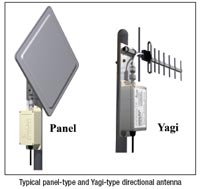
Into the Ethernet
Manufacturers take advantage of powerful communication platform
- By Ray Shilling
- Oct 02, 2008
 Over the past several years, much
attention has been paid to the
development and deployment
of IP-based video surveillance systems.
However, the rate of adoption has been
slowed in part by the heavy bandwidth
consumption of video streams and their
resulting adverse impact on the network.
Over the past several years, much
attention has been paid to the
development and deployment
of IP-based video surveillance systems.
However, the rate of adoption has been
slowed in part by the heavy bandwidth
consumption of video streams and their
resulting adverse impact on the network.
Undaunted by these restraints, manufacturers
of access control systems with
relatively low data rates have been gradually
introducing network-based offerings
of their own. The idea is to take advantage
of the powerful and ubiquitous TCP/IP
communication platform, without consuming
large quantities of bandwidth.
Furthermore, an IP network is relatively
affordable to deploy and universally understood.
Therefore, installation and configuration
challenges associated with proprietary
technologies are all but eliminated.
However, in many cases, a wire-line
network connection is not readily available
at all locations where access control
points may be required. Few buildings --
even those constructed in the past
decade -- include network connections
(RJ-45 ports) at their doors and gates. As
a result, wireless technologies are
increasingly being considered to deploy
these Ethernet-based edge devices.
Important Considerations
There are many factors to consider when
designing and deploying a wireless
Ethernet-based access control system:
Selecting the right products. The
single most important factor in ensuring
the successful deployment of a wireless
Ethernet access control system is selecting
the right product and transmission
frequency for the application.
For example, if the installation
includes short-range indoor transmission
to a few doors, a wireless Ethernet product
will suffice. However, if the system
includes a long-range connection to
remote buildings or across larger distances
to gates in the facility, then the
choice of products is narrowed considerably.
Other factors to consider are the
ease of installation and long-term maintenance
and support of the product suite.
Also, purchasing the lowest cost hardware
may not always be the answer, especially
if the product has a steep learning
curve and/or the technical support offered
by the manufacturer is sub-par.
 Antenna selection. An often-overlooked
aspect of the wireless system is
the antenna. For longer distances, or in
crowded RF environments, it is imperative
that a directional antenna be used
whenever possible. This increases the signal-
to-noise ratio, and therefore both the
transmission and receive power of the
radio, and allows the system to function
well now and in years to come as the RF envrionment changes.
Antenna selection. An often-overlooked
aspect of the wireless system is
the antenna. For longer distances, or in
crowded RF environments, it is imperative
that a directional antenna be used
whenever possible. This increases the signal-
to-noise ratio, and therefore both the
transmission and receive power of the
radio, and allows the system to function
well now and in years to come as the RF envrionment changes.
Tamper-proofing your installation. Radio transceivers
are not -- by themselves -- a primary target for vandals.
However, the best way to keep an investment safe is
to put it out of reach of the public. Install the equipment
up a pole or on top of a building. This is generally more
favorable from an RF transmission standpoint as well.
In-band interference. The majority of Ethernet
radios sold in North America today use one of three ISM
bands: 900 MHz, 2.4 GHz and 5.8 GHz. These are unlicensed
bands, and anyone is free to deploy FCC-certified
products. For larger projects, conduct a site survey
with a portable spectrum analyzer prior to implementation
to assess the nature of the particular band chosen. If
it turns out to be crowded, the in-band noise floor will be
high and the signal-to-noise ratio will be unfavorable,
thereby adversely affecting the wireless range and performance.
Alternatively, since spectrum analyzers are
expensive, end users also can select a radio transceiver
that has the ability to scan the ISM band in which it
operates and assess the spectrum viability.
Near-band interference. Another potential pitfall is
RF noise interference from sources spectrally adjacent to
the ISM band. For example, the FCC-reserved space for
the 900 MHz band is 902 to 928 MHz. Unfortunately,
several legacy paging systems use the space immediately
above this in the 929 to 931 MHz range. While this
frequency is not actually in the ISM band, the near-band
interference can be significant since the output power
from the paging tower is often several orders of magnitude
higher than the lower power commercial off-theshelf
wireless Ethernet systems running in the ISM band
itself. To address this, notch filters preferentially discard
all frequencies except the band in which you are operating.
This allows the installer to add an inline component
to neutralize the adverse effects of this interference.
Training. Many wireless Ethernet manufacturers
offer free technical training, either with online webinars
or, in some cases, on site and in person, in conjunction
with their network of manufacturers’ reps. End users
should participate in this training before attempting to
install a large-scale wireless access control system.
Technical support. If an end user is new to the technology
and the selected product suite, it is important to
have access to the manufacturer’s technical support team
during the early stages of the job. Beginning the project
late on a Friday afternoon and planning to work through
the weekend may not be in your best interest until you
are comfortable with the process and potential issues.
Replacement/spare parts. As with any mission-critical
network technology, it is always a good idea to keep
spare parts on hand. For example, if you have deployed
25 radio transceivers, antennas and mounting hardware,
it might make sense to purchase one or two extra kits in
case of a failure.
The most likely cause of system failure is human
error. The most important thing to do prior to beginning
an installation is to read the user manual. Always use
high-quality cabling and connector components.
Skimping can cost you hundreds of dollars in labor costs
and down time. As with any networking device, check
the connectors and cabling to make sure they are seated
properly and are in good working condition.
Additional Factors
If there is a poor signal-to-noise ratio, and as a result, the
system is dropping Ethernet packets and unable to reliably
send data, you should check to see if there is inband
or near-band interference in the area, or if your
neighbor has installed a high-powered source of RF
interference recently. Also determine if you are attempting
to transmit too far or through obstacles with an RF
spectrum not designed for this purpose. Consider swapping
the radios for another frequency that may be better
suited for your installation. Also, check to see if the system
is using directional antennas. Omnidirectional
antennas suffer a double whammy: not only do they have
less transmission power, but they also pick up interference
from all directions. If you are already using a directional
antenna, try upgrading to a more powerful model
with more RF gain.
In reviewing the published cost-benefit analyses of
wired IP-based access control systems, we see that it
generally makes sense to use the existing network
infrastructure -- versus installing dedicated cabling --
to transmit access control data from doors and gates
back to a central management server or off-site backup.
It is for this reason that most industry experts
believe that, over time, traditional proprietary access
control systems will be replaced by open-standard
Ethernet-based systems.
To examine a basic total cost of ownership, use the formula
of TCO = [(equipment + installation labor) + disruption
in service] + long-term maintenance to compare and
contrast wired versus wireless access control solutions. It
will reveal that using wireless transmission technologies
is not always wise. For example, when network cable is
already in place at the door or for short cable runs, the
additional cost of the radio and antenna at the control
panel or door is not justified. If new cable has to be pulled,
then the total cost of cable, labor and disruption of service must be compared to the cost of a radio transceiver and
antenna at the panel or door.
There are many compelling reasons to use open standards --
such as Ethernet -- to transmit access control
data. Furthermore, in many cases, it makes sense to send
an Ethernet packet via a low-cost wireless radio transceiver
rather than copper cable or glass fiber. In the end,
this cost-benefit analysis must be performed for each
project undertaken, which will in turn reveal the appropriate
network architecture for the job.
Back to the Future
The ability to use a single radio platform to transmit
Ethernet and RS-232/RS-485 serial data is compelling.
Therefore, much work is currently being done in integrated
Ethernet/serial radio transceivers. Look for the
continued release and refinement of this dual-platform
approach to add to the current generation of radios capable
of handling specific proprietary access control protocols
such as Wiegand.
The latest release in the class of 802.11 Ethernet
transmission systems is the “N” specification. The
802.11N protocol uses MIMO multipath processing
and channel bonding to offer some advantages in range
and net throughput over traditional Wi-Fi solutions.
Several mainstream manufacturers have released products
in this category with more to come over the next
several years.
During the last five years, mobile phone technology
has evolved to include data transmission at moderate
speeds and distances. Integrating this technology into
fixed-in-place devices allows the system designer to
install 2.5 G and 3 G network cards to send/receive data
from a variety of platforms. These technologies are
becoming faster and more cost effective.
WiMax, a new technology that began its conceptual
development in 2001, is based upon the 802.16 standard
and uses fixed-in-place high-powered transmission equipment
to send and receive high-speed data. The WiMax
forum, which developed and manages the framework,
describes WiMAX as “a standards-based technology
enabling the delivery of last-mile wireless broadband
access as an alternative to cable and DSL.” Connecting to
a WiMax network will allow the end user to send and
receive moderate to high-speed data rates with the network
to connect remote access-control devices.
Since the data rates in question are orders of magnitude
lower than in the case of IP video products, the
challenges associated with bandwidth consumption also
are minimized, and the rate of adoption of networkbased
access control systems will continue to grow. The
use of wireless transmission to support the remote
deployment of Ethernet devices is a natural extension of
the technology and will only accelerate
the growth of IP-based access
control solutions.